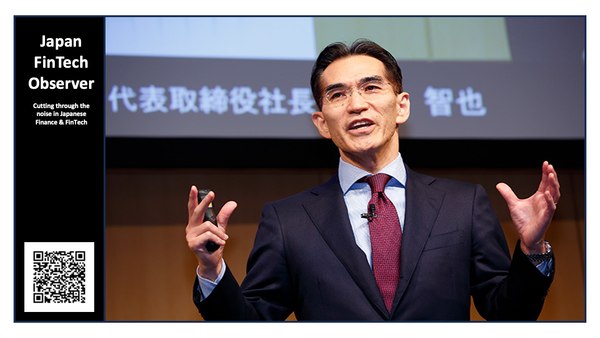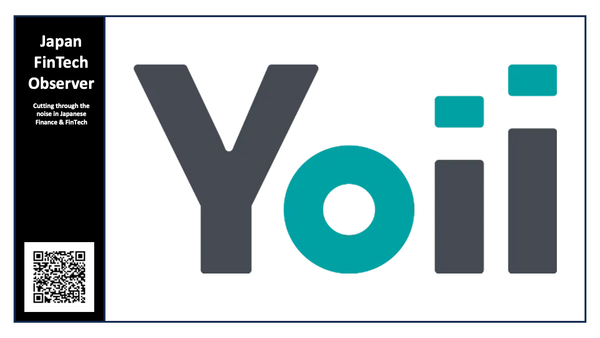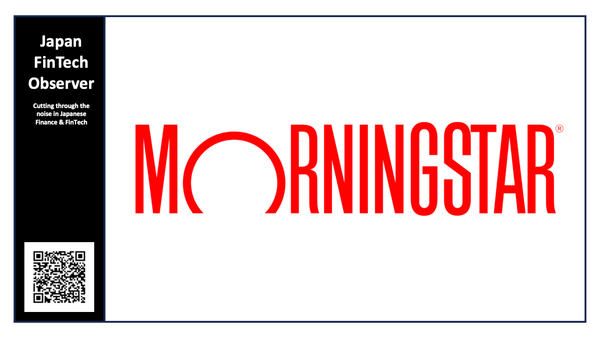Japan FinTech Observer #135

Welcome to the one hundred thirty-fifth edition of the Japan FinTech Observer.
There is a fair chance that you have read more than your fair share of characterizations of what Takaichi is and is not, and what her policies will or will not be. As always, we encourage you to go to the primary source, in this case "The LDP & Japan Innovation Party Coalition Agreement", both in summary form and full translation.
Regarding the question whether we will get "Abenomics 2.0", our brilliant former colleagues at Goldman Sachs have put together the following simple table that demonstrates the difference in the economic environment on the outset of their premierships.

On monetary policy, Finance Minister Katayama has not gone beyond the Prime Minister's comment that it is vital for the Bank of Japan and the Government to maintain close coordination and communication. Our panel of economists (GS, Nomura, MUFG, among others) believes the Bank of Japan will hold rates steady during this week's Monetary Policy Meeting, but likely prepare the ground for the next hike by adapting the language in its Outlook Report.
Otherwise, the highlights of the week include the Nikkei cracking the 50,000 index level, a highly anticipated FinTech IPO that turned into a blooper, and the launch of Japan's first payment provider-issued, JPY-backed stablecoin.
Here is what we are going to cover this week:
- Venture Capital & Private Markets: gumi joins SBI Holdings as Investor in Evernorth, an XRP Treasury Business; Z Venture Capital co-leads Habit Factory's KRW 35 billion Series D Round; ASUENE's final close of Series C2 Round and second US M&A; DG Daiwa Ventures completes final close for Fund III and renewal of corporate identity; SBI Holdings makes strategic investment in new fund established by AI2 Incubator
- Banking: MILIZE announces the introduction of a life plan simulation function developed by the company into the "Chibagin App"; SMBC Group has published its "Impact Report 2025"
- Payments: Japanese Yen stablecoin "JPYC" and issuance platform "JPYC EX" launched on October 27; SBI Holdings-owned B2C2 has launched PENNY, the industry’s first zero-fee stablecoin swap solution
- Capital Markets: the Infcurion IPO; corporate Japan’s cross-border funding enhances financial flexibility
- Asset Management: GPIF begins building database with BNY to benchmark alternative assets
- Digital Assets: the 4th Meeting of the Financial System Council Working Group on Crypto-Assets; TSE-Listed Quantum Solutions becomes largest ETH DAT outside the US
- The Last Word: Sustainable Trade Index
Venture Capital & Private Markets
- gumi joins SBI Holdings as Investor in Evernorth, an XRP Treasury Business; gumi has invested in a PIPE (Private Investment in Public Equity) financing for Evernorth, a U.S.-based company, alongside SBI Holdings, gumi Group's largest major shareholder and capital and business partner, Ripple Labs, and other investors; Evernorth is a company established to promote the adoption of the crypto asset XRP at an institutional scale; the company plans to list on the U.S. Nasdaq market with the ticker XRPN through a business combination with Armada Acquisition Corp. II, a special purpose acquisition company, and is expected to raise a total of over USD 1 billion; the investment from gumi will be USD 5 million
- Z Venture Capital co-leads Habit Factory's KRW 35 billion Series D Round: Habit Factory, a Seoul, South Korea-based AI-driven fintech company, has raised KRW 35 billion in Series D funding; the round was led by Z Venture Capital (ZVC) and Smilegate Investment, with participation from Industrial Bank of Korea, IBK Venture Investment, Kolon Investment, KB Investment, and Shinhan Venture Investment; Z Venture Capital (ZVC) is the corporate venture capital (CVC) arm of LineYahoo (LY) Corporation; ZVC invests across all stages from seed to late-stage in global startups, focusing on areas that create synergy with its parent company’s ecosystem, particularly AI, data technologies, media, commerce, and fintech
- ASUENE's final close of Series C2 Round and second US M&A: ASUENE has completed the acquisition of 100% of the shares and integration of Iconic Air, a U.S. company providing GHG visualization and methane leak management SaaS; additionally, ASUENE has completed the final close of its Series C2 round through a third-party allocation of shares to new investors including JGC Mirai Investment and Sony Financial Ventures・GB No. 2 Investment, as well as existing investor Sumitomo Mitsui Financial Group; through this funding round, ASUENE raised 780 million yen through new share issuance in Series C2 and completed 2.2 billion yen in secondary transactions by existing shareholders
New Funds
- DG Daiwa Ventures completes final close for Fund III and renewal of corporate identity: DG Daiwa Ventures (DGDV), a venture capital firm investing both domestically and internationally, has completed the final close of "DGDV Fund III E.L.P. Cayman", which targets seed and early-stage startups in Japan and abroad, at over 10 billion yen; additionally, coinciding with the launch of Fund III, DGDV has renewed its corporate logo and will continue to dedicate itself to contributing to the expansion of the startup ecosystem as a global VC originating from Japan
- SBI Holdings makes strategic investment in new fund established by AI2 Incubator: SBI Holdings, through its U.S. subsidiary SBI Holdings USA, has made an investment in the AI2 Incubator Fund III newly established by AI2 Incubator Partners, an AI incubator; this investment aims to capture global investment opportunities in the AI field and strengthen collaboration with startups possessing cutting-edge technology; AI2 Incubator Partners is a prominent U.S. AI incubator that spun out from The Allen Institute for AI, which was established by Microsoft co-founder Paul Allen; it specializes in transforming groundbreaking AI research into commercial venture companies; since its establishment, it boasts an outstanding track record with 90% of incubated startups successfully raising funds, and 24% being acquired by major technology companies such as Apple, DocuSign, and Thomson Reuters
Other
- Overview of Japanese Startup Investment for US VCs, published by JETRO's San Francisco office
Banking
- MILIZE announces the introduction of a life plan simulation function developed by the company into the "Chibagin App," a smartphone application provided by The Chiba Bank; this function calculates future income/expenditure and savings trends based on information entered by customers; by utilizing statistical data, it is possible to enter information easily even without knowing detailed amounts such as annual income and living expenses; it supports a shift from conventional one-time life plans to long-term, life-accompanying life plans
- SMBC Group has published its "Impact Report 2025"
- The Financial Services Agency has published an English translation of its "Guidelines on Cybersecurity for the Financial Sector"
Financial System Report
The Bank of Japan has published its "Financial System Report" for October 2025.
Japan's financial system has been maintaining stability on the whole.
Financial intermediation has continued to function smoothly, and no major financial imbalances have been seen in the financial intermediation activities.
Risks faced by financial institutions
- The quality of banks' domestic and foreign loan portfolios has been maintained. With corporate profits being on an improving trend on the whole, bankruptcies have been more or less unchanged, albeit with fluctuations. The quality of banks' foreign loan portfolios has continued to be maintained as banks have been selective in their foreign lending.
- With the links between (1) the domestic banking sector and financial markets and (2) the foreign NBFI sector strengthening, Japan's financial system may have become more susceptible to fluctuations in global financial markets and the influence of foreign investment funds. Keeping these points in mind, banks need to identify and manage risks associated with securities holdings.
- Banks have sufficient yen funding liquidity. As for foreign currency, they have maintained stable funding. Banks need to continue to work toward establishing stable funding bases.
- Banks need to continue to properly manage risks related to digital technologies and climate-related financial risks.
Resilience of the financial system
- Regarding banks' loss-absorbing capacity, their capital well exceeds regulatory requirements.
- Banks' amount of yen interest rate risk relative to their capital has remained low with that on the asset and liability sides being more or less in balance.
- Based on the results of the macro stress testing, it can be judged that the stability of Japan's financial system is maintained even under stress equivalent to the global financial crisis and compound stresses where foreign interest rates rise and global trade volume falls.
- Uncertainties remain high regarding economic policies in each jurisdiction, geopolitical risks, and global financial markets, including their future developments and impact. If stress materializes, globally active NBFIs could amplify negative shocks. Banks must remain vigilant against the materialization of various risks and implement effective measures to manage such risks.
Payments
- Japanese Yen stablecoin "JPYC" and issuance platform "JPYC EX" launched on October 27; JPYC EX is the official platform for conducting JPYC issuance and redemption procedures; registered users can make issuance reservations on JPYC EX and receive JPYC to their registered wallet address by depositing Japanese yen into a designated account via bank transfer; similarly, users can make redemption reservations on JPYC EX and receive Japanese yen payouts to their registered withdrawal account by sending JPYC to a designated address; JPYC will initially support Avalanche, Ethereum, and Polygon, with plans for further expansion
- JPYC was also featured on NHK World
- SBI Holdings-owned B2C2 has launched PENNY, the industry’s first zero-fee stablecoin swap solution; as the number of different stablecoins grows worldwide—each with different issuers, blockchains, and redemption processes—institutions face mounting operational complexity in managing liquidity across this fragmented ecosystem; PENNY solves this challenge by enabling market participants, including banks and merchant acquirers, stablecoin infrastructure firms, money transfer organizations, and crypto exchanges, to instantly and automatically swap one stablecoin for another with no fees; using B2C2's institutional-grade trading platform, trade execution and settlement happen simultaneously on-chain to help eliminate counterparty and operational risk
Capital Markets
- The Infcurion IPO: Infcurion debuted on the TSE’s Growth Segment on Friday, October 24, 2025; after bookbuilding resulted in a ¥1,680 reference price, above the indicated range up to ¥1,600, the stock’s first quote was ¥1,560, and the closing price ¥1,451, altogether an underwhelming debut; at the closing price, Infcurion is valued at approximately ¥30 billion, largely in line with the ¥10 billion investment SMBC Group made in September 2024 for what now turns out to be a 29% stake; “dressed for success” for the IPO with operating expenses down 13 percentage points year-on-year, first-time consolidated profitability, and a stock market near record highs had many believe in a more dynamic debut; even the recent Sony Financial spin-off popped 40% before settling back to its reference price since
- S&P Global: Corporate Japan’s cross-border funding enhances financial flexibility; Japanese corporations are increasingly turning to overseas markets for funding, a trend driven by strategic global expansion, unfavorable domestic funding dynamics, and the inherent limits of the Japanese bond market; this diversification is seen as a positive factor supporting the financial flexibility and credit profiles of Japanese issuers
Asset Management
- GPIF begins building database with BNY to benchmark alternative assets: the Government Pension Investment Fund (GPIF) has been increasing its exposure to alternative investments (infrastructure, private equity and real estate); to regularly and efficiently obtain detailed data on the investment performance of funds in the market, GPIF begins building a database on alternative assets; unlike traditional assets, such database is not common in the alternative investment market; therefore, the GPIF will need to directly collect data from individual fund managers (both overseas and domestic); GPIF has recently hired Eagle Investment Systems (an affiliate company of The Bank of New York Mellon) as the vendor to collect data
Digital Assets
- The 4th Meeting of the Financial System Council Working Group on Crypto-Assets: the Financial Services Agency (FSA) hosted the 4th Meeting of the Financial System Council Working Group on Crypto-Assets on October 22, 2025; the discussion focused heavily on cybersecurity, the strengthening of the self-regulatory organization (SRO) Japan Virtual and Crypto Assets Exchange Association (JVCEA), and the future regulatory framework for crypto assets, including investor protection and market integrity
- TSE-Listed Quantum Solutions becomes largest ETH DAT outside the US; Quantum Solutions acquired an additional 500.43 ETH (approximately $1.925 million USD) through its Hong Kong subsidiary GPT Pals Studio Limited; this brings the group's total ETH holdings to 4,366.27 ETH (total acquisition cost approximately $17.78 million USD), establishing Quantum Solutions as the largest Ethereum Digital Asset Treasury (DAT) company outside of the US
The Last Word: Sustainable Trade Index
The Hinrich Foundation-IMD Sustainable Trade Index measures 30 economies’ readiness and capacity to participate in the global trading system in a manner that supports the long-term goals of economic growth, environmental protection, and societal development.
The Japan-specific profile has been posted here.

Please follow us to read more about Finance & FinTech in Japan, like hundreds of readers do every day. Our short weekly digest, the “Japan FinTech Observer”, is published on LinkedIn, on Medium & Substack, or here on our own FinTech Observer website. Only the latter provides you with the option to subscribe to individual news stories as they are published.
Should you wish to further discuss the Japanese (or Asian) FinTech ecosystem, you may book a consultation via Intro - all proceeds flow towards covering the operating cost of the Tokyo FinTech Association, and research for the Japan FinTech Observer.




